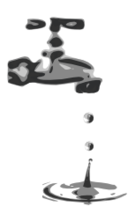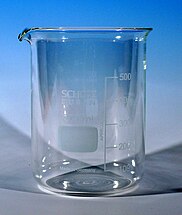Wikijunior:Big Book of Fun Science Experiments/Explosive foam
Appearance
You really need a proper science lab and a trained presenter to do this experiment. It is more of a demonstration than a participatory exercise.
Ingredients
[edit | edit source]- A tub which holds about 1 gallon
- Water
- Soap
- A beaker or test tube
- A stopper with a hole
- Glass elbow and rubber tubing
- Hydrochloric acid
- Magnesium ribbon
- A lighter
What to do
[edit | edit source]- Step 1: Fill the tub with very soapy water
- Step 2: Fill the beaker or test tube about half way with hydrochloric acid
- Step 3: Attach the glass elbow and the hose to the stopper
- Step 4: Place the other end of the hose in the tub of soapy water
- Step 5: Add a small amount of the magnesium ribbon to the beaker and quickly cover the top with the stopper; hold the beaker so it is lower than the tub and there are no kinks in the hose
- Step 6: Bubbles will appear in the tub
- Step 7: Pick up some bubbles with your hand and light them with the lighter; they should go up quite spectacularly without burning your hand
- Step 8: When you get tired of playing with the bubbles, you can light the ones left in the tub all at once. FWOOSH!
Principle
[edit | edit source]Magnesium and hydrochloric acid react to create hydrogen gas and magnesium chloride. The chemical equation looks like this:
Mg (s) + 2HCl (aq) --> H2 (g) + MgCl2 (aq)
Because Hydrogen gas is lighter than air, it travels up the tube and bubbles through the water. Hydrogen gas burns at a relatively low temperature and shouldn't harm your hand when you light it.







